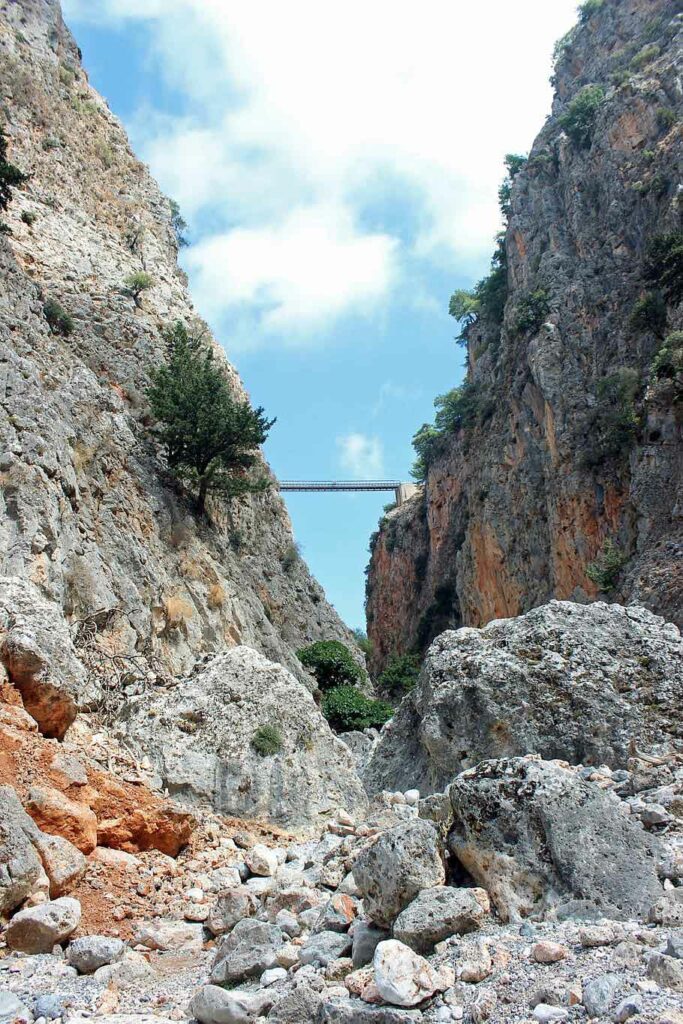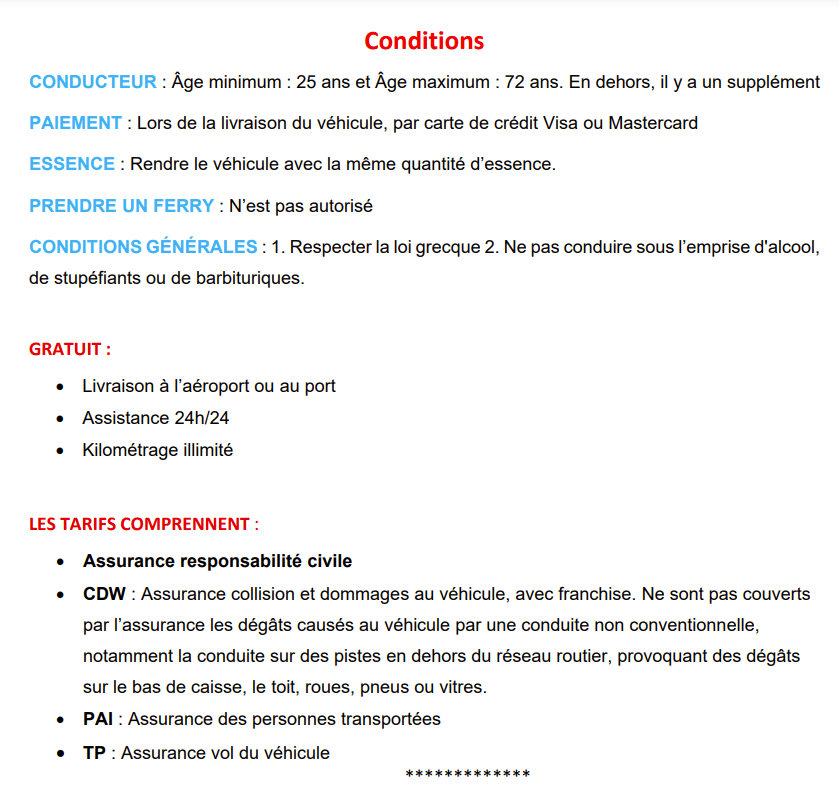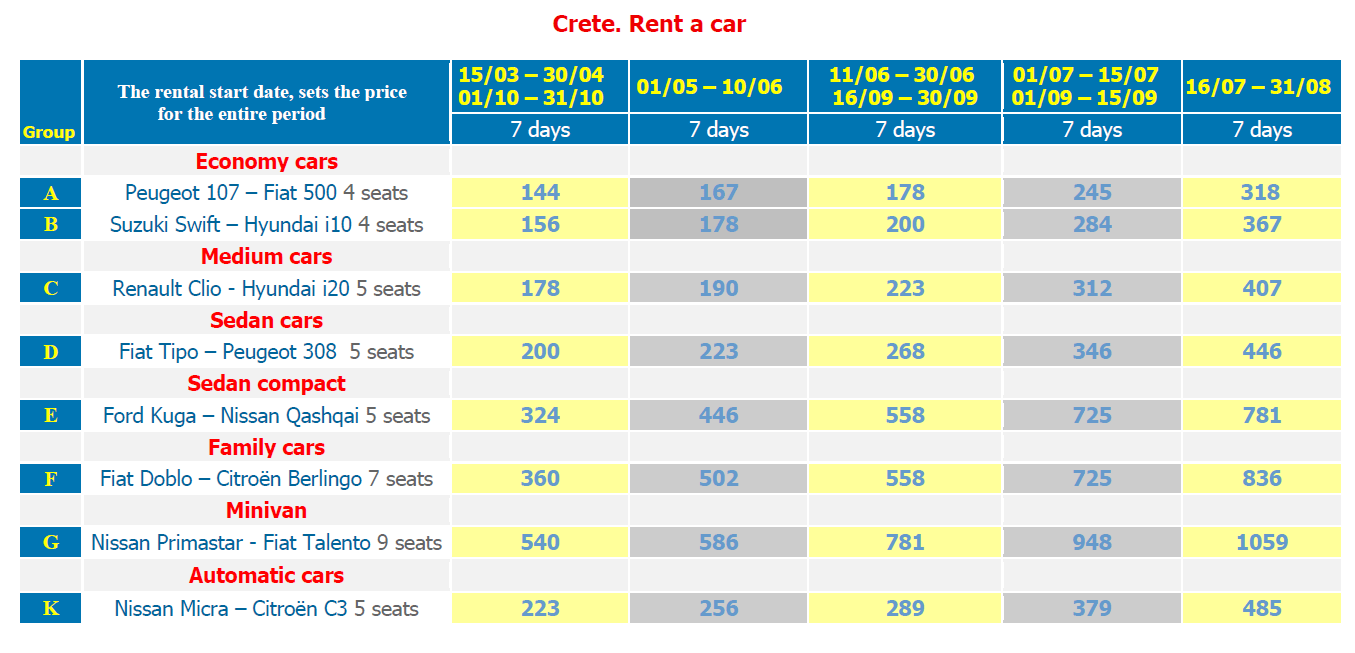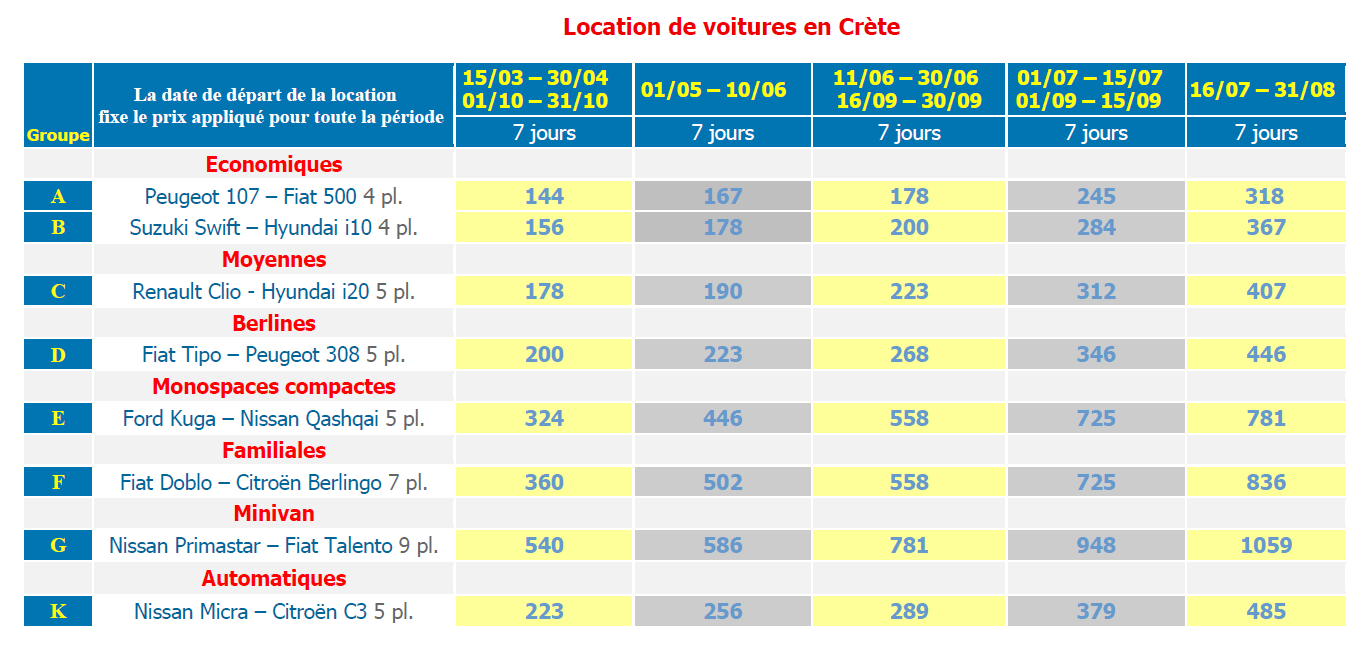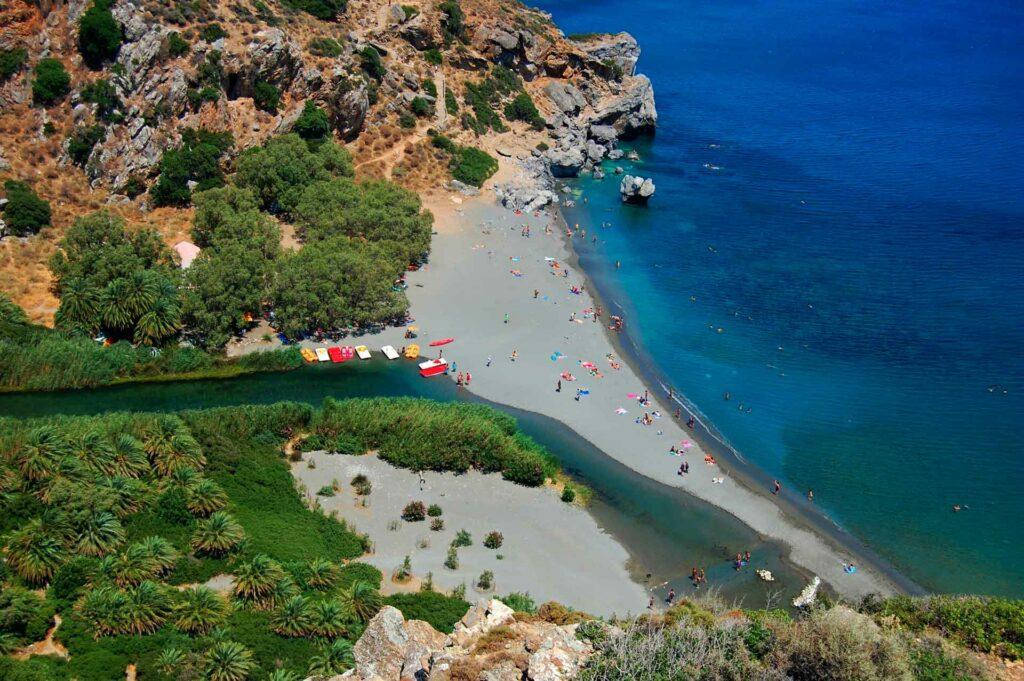
Crete and mythology
Ariadne's thread Daedalus and Icarus The Europe
… Crete-mythology. A terrible misfortune had befallen the city of Athens. Androgeus, only son of Minos, the powerful King of Crete, lost his life during a visit to the Athenian King Aegeus. In defiance of all tradition, Aegeus had sent his guest on a dangerous expedition to kill a fearsome bull.
It was the bull that killed the teenager and Minos, in retaliation, invaded the country, took Athens and declared that he would raze the city to the ground unless the Athenians agreed to pay him tribute of seven young men and as many young women every nine years. A terrible fate awaited these unfortunate people. As soon as they arrived in Crete, they were fed to the Minotaur.
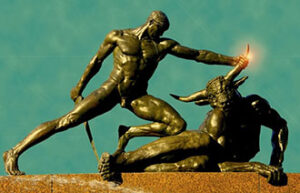
It was a half-bull, half-man monster, the offspring of Minos' wife Pasiphae and a bull of marvellous beauty. Poseidon had once given this bull to Minos to offer him as a holocaust, but Minos could not decide to sacrifice it and kept it for himself. As a punishment, Poseidon made Pasiphae fall in love with the beast.
When the Minotaur was born, Minos did not kill him. He ordered Daedalus, the great architect and inventor, to build a place of confinement from which it would be impossible to escape, and Daedalus built the Labyrinth, which has become famous the world over. Once inside the maze, there was no way out.
When the Minotaur was born, Minos did not kill him. He ordered Daedalus, the great architect and inventor, to build a place of confinement from which it would be impossible to escape, and Daedalus built the Labyrinth, which became famous throughout the world. Once inside the maze, there was no way out. It was here that the young Athenians were led to become the victims of the Minotaur. They had no way of escaping him, for if they ran, they risked meeting the monster at every turn of the enclosure, just as he might appear at any moment if they remained motionless. Such was the doom promised to the fourteen young Athenian men and women a few days after Theseus' arrival in the city. The time had come for a new delivery of the tribute.
Theseus, son of King Aegeus, immediately came forward and offered to be among the victims. Everyone appreciated his generosity and admired his greatness of spirit, but no one suspected that he intended to kill the Minotaur. However, he confided his intention to his father and promised that if he succeeded, he would change the black sail that was always hoisted on the ship carrying the lamentable cargo into a white one, so that Aegeus would know long before he touched land that his son was coming back to him safe and sound.
When they landed in Crete and before being led to the Labyrinth, the young Athenians had to parade before the islanders. Ariadne, the daughter of Minos, was among the spectators; she saw Theseus passing by and was infatuated at first sight.
Like an oak tree falls on the hill She sent for Daedalus and asked him to show her a way out of the Labyrinth; then she sent for Theseus; she told him that she would ensure his escape on condition that he promised to take her with him to Athens to marry him. He, no doubt, had no difficulty in agreeing to this; so she gave him what she had received from Daedalus, a length of thread which he was to tie at one end to the inside of the door and unwind as he went along. This he did, and now assured that he could retrace his steps, he boldly set out to find the Minotaur. The monster was asleep when he found it; Theseus sprang up with his sword and pinned it to the ground; then with his fists - he had no other weapon - he hammered the beast to death:
The monster was asleep when he found him; Theseus rushed forward, sword raised, and pinned him to the ground; then, with his fists - he had no other weapon - he hammered the beast to death:
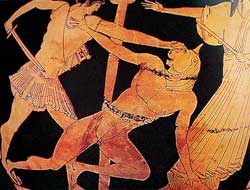
Crushing everything under its weight
So did Theseus. He expressed life
Of the savage brute and now she's dead.
Only the head still moves but the horns are useless.
When Theseus stood up after this terrifying fight, the wire pack was still where he had dropped it - he had only to make his way out. The others followed, and taking Ariadne with them, they ran to the ship that returned to Athens after crossing the sea.
On the way, they landed on the island of Naxos and what happened there is related with some variations. One account says that Theseus left Ariadne there. She was asleep and he took advantage of this to set sail again, without her. Dionysus then met her and consoled her. The other version is much more favourable to Theseus. Ariadne was suffering from a violent seasickness, so the hero had her put ashore for a short rest while he himself went back on board to attend to some urgent task. A stormy wind blew the ship out to sea and kept her there for a long time. On his return, the hero learned that Ariadne had died and was greatly distressed.
Both versions agree that he forgot to hoist the white sail as he approached Athens; perhaps his joy at the success of his voyage had driven all other thoughts from his mind, or perhaps his grief at losing Ariadne.
However, the black sail remained attached to the mast, and from the Acropolis, where he had been staring at the sea for days, his father saw it. For him it was the sign of his son's death; from the top of a rock he plunged into the sea and died. And since then the sea into which he fell has been named after him, Aegean.
Theseus thus became King of Athens, and a wise and selfless ruler if ever there was one.
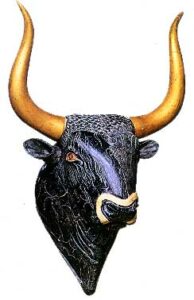
He immediately declared that he had no desire to rule, but wanted a government of the people by the people, where all would be equal. He therefore renounced royal power and established the republic; he had a council hall built where all citizens would meet and vote.
He kept for himself only the office of Commander-in-Chief. And so Athens became the happiest and most prosperous of all the world's cities, the only home of real freedom, the only place on earth where people governed themselves.
And it was for this reason that, during the great War of the Seven against Thebes, when the victorious Thebans refused to bury those of their enemies who had died, the defeated turned to Theseus and Athens, convinced that free men led by such a man would never consent to such an injustice towards the dead.
Their prayers were not in vain. Theseus led his army against Thebes, conquered the city and forced it to grant burial to the dead. But the triumphant hero refused to repay the Thebans evil for evil and behaved like a perfect knight.
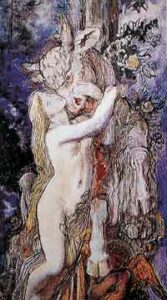
He forbade his soldiers to enter the city and plunder it; he had not come to punish the Thebans but to bury the dead Argives, and when his duty was done he led his army back to Athens.
He shows the same qualities in many other stories.
He welcomed the ageing Odipus whom everyone had rejected; he stayed by his side when he died, supporting and comforting him. He protected the two helpless daughters of the same Oedipus and on the death of their father sent them safely home. When, in a fit of madness, Heracles killed his wife and children and then wanted to kill himself when he came to his senses, Theseus alone remained with him. Fearing that they would be contaminated by the presence of a man guilty of such a crime, all the other friends of Heracles had fled, but Theseus reached out to him, raised his courage, made him understand that to kill himself would be cowardice, and finally took him back with him to Athens.He welcomed the ageing Odipus whom everyone had rejected; he stayed by his side when he died, supporting and comforting him. He protected the two helpless daughters of the same Oedipus and on the death of their father sent them safely home. When, in a fit of madness, Heracles killed his wife and children and then wanted to kill himself when he came to his senses, Theseus alone remained with him. Fearing that they would be contaminated by the presence of a man guilty of such a crime, all the other friends of Heracles had fled, but Theseus reached out to him, raised his courage, made him understand that to kill himself would be cowardice, and finally took him back with him to Athens.
Yet all the duties of state and all the exploits required of a knight-errant to defend the weak and oppressed were not enough to curb Theseus' passion for the danger itself. He went to the land of these warrior women, the Amazons, - some say with Heracles, others, alone - and kidnapped their Queen, sometimes named Antiope and sometimes Hippolyta. It is certain that the son she gave to Theseus was called Hippolytus and that after his birth the Amazons invaded Attica, the country surrounding Athens, and even managed to penetrate the city. They were finally defeated and as long as Theseus lived, no other enemy ever entered Athens again.
He had many other adventures. He was one of those who embarked on the Argo and set out to conquer the Golden Fleece. He took part in the great Calydonian Hunt, when the King of Calydon called upon the most noble princes of Greece to help him exterminate the terrible boar that was ravaging his country. It was then that Theseus saved the life of Pirithoes, his reckless and impetuous friend, as he was to do many times afterwards. Although Pirithoes was just as adventurous as Theseus, he certainly did not achieve the same successes and was thus constantly in trouble. Theseus, who was very fond of him, helped him out every time. (see our page (La Crète et sa mythologie). Voir nos pages Top 10 in Crete and the Knossos museum
"Mythology: Timeless Tales of Gods and Heroes"
Edith Hamilton
Daedalus and Icarus
… Crete-mythologyDaedalus was the architect who built the Labyrinth for the Minotaur on Crete and showed Ariadne how Theseus could escape. When King Minos heard that the Athenians had found a way to escape, he was convinced that they could not have succeeded without Daedalus' help.
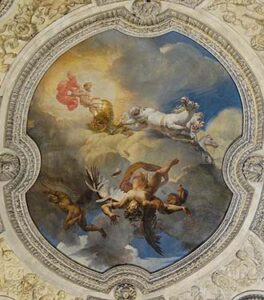
Consequently, he imprisoned the architect and his son in this same labyrinth, which would tend to prove the excellence of the plan of this enclosure, since without any indication, even its author could not discover the exit. But the great inventor was not bothered for so little. He said to his son:
Leakage may be impeded by land and water
But the air and sky are free.
. and he made two pairs of wings, which he attached with wax to his shoulders and those of his son Icarus. Before taking flight, Daedalus warned Icarus not to rise too high above the sea, for, he said, if he came too close to the sun, the wax might melt and the wings would come off. But as so many stories show us, youth does not pay much heed to what its elders say. So they both rose, lightly and effortlessly, and left Crete;
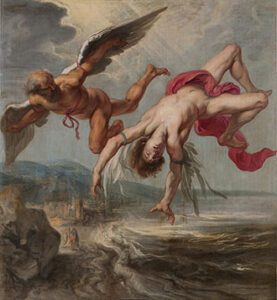
The rapture of this new and marvellous power intoxicated the teenager. He climbed higher and higher, refusing to listen to his father's anguished pleas. And then his wings fell off. He fell into the sea and the waters closed in on him. Thus Icarus gave his name to the nearby island and the sea that surrounds it.
The distraught father continued on his way without incident and landed in Sicily, where he was warmly welcomed by King Cocalos.
The thrill of this new and wonderful power intoxicated the teenager. He climbed higher and higher, refusing to hear his father's anguished pleas. And his wings fell off. He fell into the sea and the waters closed over him. Thus Icarus gave his name to the nearby island and the sea around it.
The distressed father continued on his way without accident and landed in Sicily, where he was very well received by King Cocalos.
Enraged by this escape, Minos decided to find Daedalus. To achieve this, he used trickery. He had it proclaimed everywhere that he would give a great reward to anyone who succeeded in passing a thread through the volutes of a shell with particularly tangled spirals. Daedalus told the King of Sicily that he was confident he would succeed. He drilled a small hole in the end of the shell, attached a thread to the leg of an ant, inserted the ant into the hole and plugged it. When the ant finally came out of the other end of the shell, the thread, of course, had followed it around. " Only Daedalus could imagine
such a scheme "Minos said, and set off for Sicily to seize the architect. But King Cocalos refused to hand him over and in the ensuing struggle Minos was killed. Crete-mythology
"Mythology: Timeless Tales of Gods and Heroes"
Edith Hamilton
L'Europe
… Crete-mythologyIo was not the only girl who owed her geographical fame to Zeus' love. There was another, much more famous one - Europa, daughter of the King of Sidon. But while the unfortunate lo paid dearly for being so distinguished, Europa on the other hand fared very well. Except for the few moments of terror she felt at finding herself crossing the sea on the back of a bull, she never suffered.
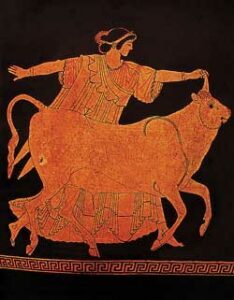
The story does not say what Hera was doing at the same time, but it is clear that her vigilance was singularly asleep and her husband, as a result, free to do as he pleased.
It was a beautiful spring morning, and while he was nonchalantly observing the earth from the heavens, Zeus suddenly saw a charming sight. Europe had woken up very early that day, disturbed as lo had been before her by a dream; only this time it wasn't about a god who had fallen in love with her, but about two continents, each of which, in the form of a woman, was trying to possess her. Asia claimed to have the right of ownership because she had given birth to him, and the other - as yet unnamed - declared that Zeus would give her to him.
Freed from sleep at the same time as this strange vision that had come to her at dawn - the moment when true dreams most often come to mortals - Europe decided not to go back to sleep but to call her companions, all born in the same year as her and all of noble origin, and to suggest a trip to the flowery meadows by the sea. It was their favourite meeting place, either for dancing, bathing or picking flowers.
This time, knowing that the flowers had reached their moment of perfection, they all took baskets. Europa's was made of gold, delicately chiselled with figures that told the story of her travels in the form of a cow, the death of Argus, and finally Zeus touching her lightly with his hand and giving her back her human form. It was, no doubt, a marvel worthy of admiration and the work of no less a personage than Hephaestus, the celestial worker of Olympus.
If the basket was charming, the flowers destined to fill it were no less so: fragrant narcissi, hyacinths, violets and yellow crocuses, and above all the crimson splendour of the wild rose. Enchanted, the girls followed their pickers, moving from one meadow to the next. They were all ravishing, but Europe shone among them like the goddess of love, surpassing the Graces in brilliance. And it was precisely this goddess of love who provoked what was to happen next
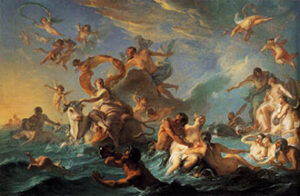
Because, I am sure, it could carry us all;While Zeus watched this beautiful spectacle from the celestial balconies, she who alone had the power to subjugate the god - alone, but with the help of her son, the malicious Cupid - took her bow and pierced the heart of Zeus with an arrow, who was instantly infatuated with a mad love for Europa. Although Hera was absent for the moment, he thought it best to show some caution, so he thought it wiser to change himself into a bull to appear before Europa. Not one of those bulls that one sees in a stable or grazing in a meadow, but a superb bull, such as one had never seen before and will never see again, with a chestnut-coloured coat, a forehead marked with a silver disc and surmounted by a crescent moon-shaped horn. He seemed so gentle that the girls were not afraid to see him approach; they surrounded him and caressed him, breathing in the perfume that came from him with delight, a perfume even more fragrant than that of the flowers of the meadow. It was to Europa that he turned, and as she gently stroked him with her hand, he mooed so harmoniously that not even a flute could have made a more melodious sound. Then he lay down at her feet, seeming to offer her his broad back, and she called out to the others to join her and ride him,
He seemed so gentle that the girls were not frightened to see him approach; they surrounded him and stroked him endlessly, breathing in with delight the scent that came from him, a scent even more fragrant than that of the flowers of the meadow. He turned to Europe, and as she gently stroked him with her hand, he mooed so harmoniously that not even a flute could have made a more melodious sound.
Then he lay down at her feet, seeming to offer her his broad back, and she shouted to the others to join her and mount him with her,
And he seems so sweet, so nice to see,
He looks more like a man than a bull
Except that he doesn't talk.
She sat smiling on the broad back, but the others, as lively as they were, had no time to follow her. The bull leapt up and ran off towards the sea, and then, not in it, but over the great expanse of water. And as he did so, the waves stilled beneath him, and a whole procession rose from the depths and followed him - the strange sea deities, Nereids riding dolphins. Tritons blowing conches, and the mighty Lord of the Sea himself, Zeus' own brother.
Frightened as much by these astonishing creatures as by the moving waters that surrounded her on all sides, Europa held on to the bull's horn with one hand and with the other raised her crimson robe to avoid getting it wet, and the winds :
Frightened as much by these astonishing creatures as by the moving waters that surrounded her on all sides, Europa held on to the bull's horn with one hand and raised her purple dress with the other to avoid getting it wet:
Swelling the folds like a sail
Swell on a boat, and gently
They made it sail.
It cannot be a bull, but certainly a god, thought Europa; and she implored him to have pity on her and not to abandon her, alone, in some foreign land. He replied, showing that she had guessed what he really was. He told her not to be frightened. He was Zeus, the greatest of all the gods, and everything he was doing right now was inspired by his love for her. He was taking her to Crete, his island, where his mother had hidden him from birth to keep him from Cronos, his father, and there she would give him :
Glorious sons whose sceptres would exercise their power
On all the men of the earth.
Of course, everything happened as Zeus had said. Crete was soon in sight; they landed and the Seasons, guardians of the gates of Olympus, decked the girl for her wedding. Her sons were famous not only in this world but in the next - where two of them, Minos and Rhadamanthus, became judges of the dead, as a reward for the justice they had shown on earth. But it is the name of Europa that remains forever best known. Crete-mythology
"Mythology: Timeless Tales of Gods and Heroes"
Edith Hamilton
Rent a car in Greece: Crete (Heraklion, Chania, Rethymnon, Agios Nikolaos) – Athens – Rhodes – Corfu – Mykonos – Santorini – Thessaloniki – Preveza/Aktion/Lefkada – Patras/Araxos – Kalamata – Paros – Syros – Kos – Naxos – Lesbos – Thassos – Zakynthos/Zante

